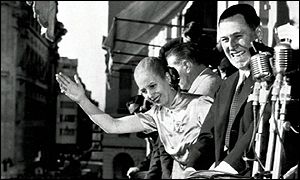

BBC News
Saturday, 3 June, 2000, 23:36 GMT 00:36 UK
The case of Eva Peron graphically illustrates a phenomenon which has been tagged VIP syndrome.
The theory is that a person's celebrity may lead to poor medical care.
The treatment of Eva's cervical cancer, once diagnosed, appears to have been excellent.
But for more than a year she resisted any attempt at proper medical evaluation despite the fact that she was growing more weak and anaemic.
Although she may have adopted a head in the sand approach to her own health, this was not entirely her fault - at no time was she made aware how potentially serious her condition was, and she went to her grave unaware that she had cancer.
Veil of Secrecy
The veil of secrecy surrounding her condition was such that when she finally underwent a hysterectomy in 1951, she was misled as to the identity of the surgeon.
She believed the operation would be carried out by the Argentine physician Ricardo Finochietto, but the procedure was actually performed by New York cancer surgeon George Pack.
Pack entered the operating room after she was sedated and left before she regained consciousness, completely breaching standard medical ethics.
Writing in The Lancet medical journal, Dr Barron Lerner, from the Center for the Study of Society and Medicine, Columbia College of Physicians and Surgeons, New York, says it was common practice in 1950s Argentina not to inform patients about their medical conditions - particularly when the diagnosis was cancer.
However, he also suggests that political considerations were an important factor in Peron's case.
"The concealment of Evita's diagnosis may in part have reflected a decision not to burden her with the ramifications of her impending death to Argentina's future," he writes.
"In addition, because the family's decision to withhold the diagnosis from Evita necessitated keeping the Argentine people uninformed, secrecy may also have had the additional benefit of hiding information that would have increased the political vulnerability of the Peron regime."